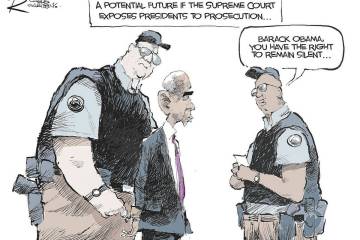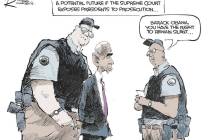COMMENTARY: Workers should be free to periodically re-assess their union representation
Few would explicitly argue for restricting workers’ choices — least of all anyone claiming to be “pro-worker” — but that’s precisely what most labor bosses have been doing for decades.
AFL-CIO President Richard Trumka, for example, has described right-to-work laws — which allow workers unhappy with their representation to opt out of a union — as an “attempt by corporate CEOs” to take advantage of workers.
He even went so far as to claim that the goal of right-to-work is “to destroy unions.”
Those are harsh words for a policy that merely allows individuals the right to choose whether or not they’ll belong to a union.
To be fair, however, not all labor bosses share this anti-choice mentality. Gary Casteel, who was once in charge of organizing Southern auto plants, pointed out in 2014 that right-to-work laws — often derided as “devastating” to unions — actually make unions more responsive to members’ needs and should therefore be celebrated as a benefit to members.
Ben Johnson, former president of the Vermont AFL-CIO who operates Progressive Labor Solutions, shares Casteel’s appreciation for right-to-work laws and the benefits they bestow upon workers. Unfortunately, Casteel and Johnson are the exceptions.
Other union leaders, unsurprisingly, are red-hot over a proposed federal reform making its way through Congress: the Employee Rights Act. This legislation would be the most comprehensive update to American labor law since the 1940s, requiring secret-ballot union elections as well as periodic recertification of unions. It would also prohibit union bosses from spending worker dues on political activity.
Anthony M. Cruz, president of the local Eastern North Carolina Central Labor Council and AFL-CIO, argues that the proposal would be the “final destruction of organized labor.” He calls such modest reforms “out of touch” with the desires of American workers.
But are they really? Not according to the very union workers Cruz claims to represent. In fact, one of the main components of the act, periodic recertification, is widely popular among union employees. That’s according to a recent study conducted for this year’s National Employee Freedom Week (Aug. 20-26). Of the roughly 1,700 union workers surveyed nationwide, more than 70 percent agreed that periodic recertification elections were a good idea.
It’s easy to see why.
As labor bosses’ rhetoric regularly emphasizes, unions are (at least, ostensibly) democratic organizations, intended to operate for the benefit of members. It stands to reason, therefore, that employees should periodically be able to vote on whether or not said union continues to act for the benefit of those employees.
Such a simple measure seems modest and logical — and yet it is surprisingly uncommon.
In Nevada, for example, recertification is so rare that the state labor board has no record of any union going through a recertification effort. The Clark County Education Association, which was authorized in 1969 as the collective bargaining agent for what is now the fifth-largest school district in the nation, has never undergone such a democratic review by its members.
In fact, of the more than 10,000 members paying dues to the CCEA in 2015, only two had originally voted in that 1969 balloting. The rest pay annual dues to an organization for which they never voted.
This scenario has played out all over the nation — where unions, once voted in, never again have to directly answer to their members. New workers simply inherit the union their predecessors had put in charge. And while states such as Nevada at least allow unhappy members to opt out, it seems that extending a little democratic review to the process for workers who remain members would be a common-sense and freedom-oriented step forward.
Which is why regular recertification has been earning more popularity as a pro-worker policy. It was a key component of Wisconsin’s controversial overhaul to labor laws, and it just recently became a key component of reforms in Iowa. Just like right-to-work legislation — now law-of-the-land in 28 states — regular recertification will soon be a commonly proposed change to the status quo.
Whether it arrives in the form of an act of Congress or comes from individual states is yet to be seen.
Labor bosses who truly prioritize their members’ well-being, such as Casteel and Johnson, will continue to be outnumbered by their management-level peers, most of whom will rail against such proposed labor laws as “union-busting.” The reason for the outrage is simple: Most union bosses see union members not as valued constituents, but as a captive source of membership dues.
How pro-worker is that?
Michael Schaus is communications director of the Nevada Policy Research Institute, a nonpartisan, free-market think tank.




























